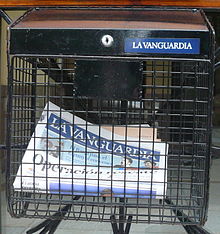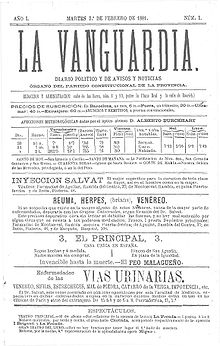La Vanguardia
 La Vanguardia in a post-box | |
| Type | Daily newspaper |
|---|---|
| Format | Tabloid |
| Owner(s) | Grupo Godó |
| Publisher | Javier Godó (Earl of Godó) |
| Editor | Màrius Carol |
| Founded | 1 February 1881 |
| Political alignment | Liberalism, Catalanism, Monarchism, Centrism |
| Language | Spanish (since 1881) and Catalan (since 2011) |
| Headquarters | Barcelona, Spain |
| Circulation | 196,824 (2011) |
| Sister newspapers | Mundo Deportivo |
| Website | www.lavanguardia.com |
La Vanguardia (Catalan: [lə βəŋˈɡwaɾðiə]; Spanish: [la βaŋˈɡwaɾðja], Spanish for "The Vanguard") is a Spanish daily newspaper, founded in 1881. It is printed in Spanish and, since 3 May 2011, also in Catalan (Spanish copy is automatically translated into Catalan). It has its headquarters in Barcelona[1] and is Catalonia's leading newspaper.
La Vanguardia, despite being mostly distributed in Catalonia, has Spain's fourth-highest circulation among general-interest newspapers, trailing only the three main Madrid dailies – El País, El Mundo and ABC, all of which are national newspapers with offices and local editions throughout the country.
Its editorial line leans to the centre of politics and is moderate in its opinions, although under Franco it followed Francoist ideology and to this day has Catholic sensibilities and strong ties to the Spanish nobility through the Godó family.
Contents
1 History and profile
2 Circulation
3 Language
4 Notable contributors
5 See also
6 References
7 Further reading
8 External links
History and profile

First issue of La Vanguardia, 1881
La Vanguardia's newspaper history began in Barcelona on 1 February 1881[2][3] when two businessmen from Igualada, Carlos and Bartolomé Godó, first published the paper. It was defined as a Diario político de avisos y notícias (Political Newspaper of Announcements and News), intended as a means of communication for a faction of the Liberal Party that wanted to gain control over the Barcelona city council.
On 31 December 1887, the paper published its last edition as a party organ, and the next day, 1 January 1888, the first day of the Universal Exposition of Barcelona, it presented a new, politically independent format with morning and afternoon editions.
It is one of the oldest papers in Spain, and is the only Catalan newspaper that has survived all the Spanish regime changes, from the restoration of Alfonso XII to the 21st century.[4]
La Vanguardia is part of the Grupo Godó.[5][6]Carlos Godó Valls took over the business in 1931. His death was one year after the death of his wife, Montserrat Muntañola Trinxet, succeeding as President his son Javier Godó Muntañola in 1987.
From 1939 to 1978 its title included the word Española in order to better accommodate the new state ideology.[7] The paper was one of two major dailies in Spain during the Franco regime together with ABC.[7] In the late 1970s and 1980s La Vanguardia had close connections with Convergence and Union alliance.[8]
In 1987 La Vanguardia received the second largest amount of state aid.[9]
La Vanguardia was published in berliner format[10][11] until 2 October 2007 when it began to use tabloid format.[12] The daily was awarded the World's Best Designed Newspaper for 1994 by the Society for News Design (SND).[13]
Circulation
The circulation of La Vanguardia was 221,451 copies in February 1970 and 218,390 copies in February 1975.[14] Five years later the circulation of the paper was 188,555 copies in February 1980.[14]
In 1993 La Vanguardia had a circulation of 208,029 copies, making it the fifth best selling newspaper in Spain.[15][16] In 1994 it was the fourth best selling newspaper in the country with a circulation of 207,112 copies.[16][17]
La Vanguardia had a circulation of 205,000 copies in 2001.[18] Its circulation was 203,000 copies in 2003.[19][20] Between June 2006 and July 2007 the daily had a circulation of 209,735 copies.[1] The 2008 circulation of the paper was 213,413 copies.[21] It was 196,824 copies in 2011.[22]
Language
The newspaper prints daily in two parallel editions, one in Spanish and, since 3 May 2011, another one in Catalan.[23] The Spanish name La Vanguardia is used for both editions (rather than L'Avantguarda, the Catalan translation).
Before the birth of the Catalan edition, letters to the editor submitted in Catalan were always left untranslated.
Notable contributors
- John Carlin
- Julià Guillamon
- Quim Monzó
- Fernando Krahn
- Pedro Madueño
- Sergi Pàmies
- Pilar Rahola
- Xavier Sala-i-Martin
See also
- Gaziel
References
^ ab Andrea Czepek; Melanie Hellwig; Eva Nowak (2009). Press Freedom and Pluralism in Europe: Concepts and Conditions. Intellect Books. p. 280. ISBN 978-1-84150-243-4. Retrieved 12 December 2014..mw-parser-output cite.citation{font-style:inherit}.mw-parser-output .citation q{quotes:"""""""'""'"}.mw-parser-output .citation .cs1-lock-free a{background:url("//upload.wikimedia.org/wikipedia/commons/thumb/6/65/Lock-green.svg/9px-Lock-green.svg.png")no-repeat;background-position:right .1em center}.mw-parser-output .citation .cs1-lock-limited a,.mw-parser-output .citation .cs1-lock-registration a{background:url("//upload.wikimedia.org/wikipedia/commons/thumb/d/d6/Lock-gray-alt-2.svg/9px-Lock-gray-alt-2.svg.png")no-repeat;background-position:right .1em center}.mw-parser-output .citation .cs1-lock-subscription a{background:url("//upload.wikimedia.org/wikipedia/commons/thumb/a/aa/Lock-red-alt-2.svg/9px-Lock-red-alt-2.svg.png")no-repeat;background-position:right .1em center}.mw-parser-output .cs1-subscription,.mw-parser-output .cs1-registration{color:#555}.mw-parser-output .cs1-subscription span,.mw-parser-output .cs1-registration span{border-bottom:1px dotted;cursor:help}.mw-parser-output .cs1-ws-icon a{background:url("//upload.wikimedia.org/wikipedia/commons/thumb/4/4c/Wikisource-logo.svg/12px-Wikisource-logo.svg.png")no-repeat;background-position:right .1em center}.mw-parser-output code.cs1-code{color:inherit;background:inherit;border:inherit;padding:inherit}.mw-parser-output .cs1-hidden-error{display:none;font-size:100%}.mw-parser-output .cs1-visible-error{font-size:100%}.mw-parser-output .cs1-maint{display:none;color:#33aa33;margin-left:0.3em}.mw-parser-output .cs1-subscription,.mw-parser-output .cs1-registration,.mw-parser-output .cs1-format{font-size:95%}.mw-parser-output .cs1-kern-left,.mw-parser-output .cs1-kern-wl-left{padding-left:0.2em}.mw-parser-output .cs1-kern-right,.mw-parser-output .cs1-kern-wl-right{padding-right:0.2em}
^ "Spain. Media". Country Studies. Retrieved 29 October 2014.
^ John Armstrong Crow (2005). Spain: The Root and the Flower: an Interpretation of Spain and the Spanish People. University of California Press. p. 411. ISBN 978-0-520-24496-2. Retrieved 27 November 2014.
^ Redacción (1 January 2000). "Más de cien años de historia". La Vanguardia (in Spanish). Retrieved 9 October 2006.
^ Enric Castelló; David Domingo (2005). "Spanish media facing new media: a challenge to journalists?". International Journal of Iberian Studies. 18 (3). Retrieved 3 December 2014.
^ "Country Profile: Spain". Institute of Media and Communications Study. Archived from the original on 21 February 2015. Retrieved 21 February 2015.
^ ab Teresa Ortiz-Gómez; Agata Ignaciuk (2013). ""Pregnancy and labour cause more deaths than oral contraceptives": The debate on the pill in the Spanish press in the 1960s and 1970s". Public Understanding of Science. 24 (6): 658–671. doi:10.1177/0963662513509764. PMID 24259515.
^ Frank R. Baumgartner; Laura Chaqués Bonafont (2014). "All News is Bad News: Newspaper Coverage of Political Parties in Spain" (PDF). Political Communication. Retrieved 4 December 2014.
^ Rosario de Mateo (1989). "The evaolution of the newspaper industry in Spain, 1939-87". European Journal of Communication. 4. Retrieved 17 April 2015.
^ "The Berliner format". The Guardian. Retrieved 24 November 2014.
^ Tony Harcup (May 2014). A Dictionary of Journalism. Oxford University Press. p. 35. ISBN 978-0-19-964624-1. Retrieved 24 November 2014.
^ Jesús del-Olmo-Barbero; Sonia Parratt-Fernández (2011). "Typography and colour: A comparative analysis of the free and paid-for newspapers in Spain". Revista Latina de Comunicacion Social (66). Retrieved 23 February 2015.
^ "World's Best-Designed winners (2006)". Society for News Design. 23 February 2011. Retrieved 6 October 2013.
^ ab Juan A. Giner (1983). "Journalists, Mass Media, and Public Opinion in Spain, 1938-1982". In Kenneth Maxwell (ed.). The Press and the Rebirth of Iberian Democracy. Westport, CT: Greenwood Press. Retrieved 25 January 2015. – via Questia (subscription required)
^ "The Daily Press". Contenidos. Retrieved 19 February 2015.
^ ab "Facts of Spain". Florida International University. Archived from the original on 21 June 2013. Retrieved 23 February 2015.
^ Jose L. Alvarez; Carmelo Mazza; Jordi Mur (October 1999). "The management publishing industry in Europe" (PDF). University of Navarra. Archived from the original (Occasional Paper No:99/4) on 30 June 2010. Retrieved 27 April 2015.
^ "Top 100 dailies 2000". campaign. 16 November 2001. Retrieved 2 March 2015.
^ Roland Schroeder (2004). "Interactive Info Graphics in Europe-- added value to online mass media: a preliminary survey". Journalism Studies. 5 (4): 563–570. doi:10.1080/14616700412331296473.
^ "World Press Trends" (PDF). World Association of Newspapers. Paris. 2004. Retrieved 15 February 2015.
^ Alan Albarran (10 September 2009). Handbook of Spanish Language Media. Routledge. p. 25. ISBN 978-1-135-85430-0. Retrieved 29 October 2014.
^ Figures covering July 2010 to June 2011 in Spain Archived 29 April 2011 at the Wayback Machine, Oficina de Justificación de la Difusión. Retrieved 28 January 2012.
^ La Vanguardia, una mirada al mundo en dos lenguas La Vanguardia. 27 February 2011. Retrieved 26 November 2014.
Further reading
- Merrill, John C. and Harold A. Fisher. The world's great dailies: profiles of fifty newspapers (1980) pp 334–37
External links
La Vanguardia newspaper website
| Wikimedia Commons has media related to La Vanguardia. |